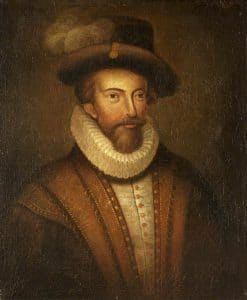Nerd of Earth’s latest installment in our Life of Sir Walter Ralegh series finds our hero on the verge of meeting one of the most effective political operators the world has ever known: Queen Elizabeth I of England.
Check out Part 1 and Part 2—they’re full of ancient ivied halls, swashbuckling adventures, and bloody war—if you want to catch up on the story so far.
Playing a Bard: Sir Walter Meets the Queen
Elizabeth was immediately taken with the fiery, brash, and impoverished young bard from Devonshire. Ralegh being surprisingly well read and experienced in the ways of the world, it did not take for him to catch the eye of the “Virgin Queen.”
(Note: While it’s impossible to verify the moniker’s truthfulness, it is certain that the “Virgin Queen” loved to toy with the young men at her court—teasing and flirting with them, playing them off one another, making them compete for her attention. Elizabeth’s “dalliances” with these brave, educated, often wealthy young men made her the focal point of political power and patronage in Britain and gave those critical of her femaleness something to gossip about while she proceeded to actually govern the realm. Like I said: master political operative.)
The Queen called Ralegh her Oracle, and she was his Cynthia (it’s worth noting that Cynthia originated as an epithet of the Greek goddess Artemis, who was, among many other things, the goddess of virginity—something that would not have gone unnoticed by either Ralegh or Elizabeth).
The court was aflame with gossip about this new favorite who was quickly transformed by Elizabeth’s favor from an unknown country soldier to the Captain of the Yeoman of the Guard—the commander of the Queen’s personal bodyguards and the person physically the closest to Elizabeth at all hours of the day.
The honors piled up quickly. Ralegh was granted vast estates in Ireland and England; he became the MP (Member of Parliament) for Devonshire; he was made Lieutenant of Cornwall, Vice-Admiral of Cornwall & Devon, and knighted in 1585.
The Queen gave him personal use of Durham House on the Strand, where he lived for almost twenty years and hosted two Algonquin Indians, Manteo and Wanchese, who visited England in 1584. Most financially important of all, Elizabeth made him the Lord Warden of the Stanneries, which gave Sir Walter control of all tin mines in the southwest of England and private monopolies on wine and broadcloth.
Not too bad for a bard, eh?
Jealousy reigned among Elizabeth’s courtiers. According to the Restoration antiquarian John Aubrey, Ralegh was “damnable proud” and blessed with a splendid sense of fashion, neither of which sat well with the noblemen competing for the Queen’s favor (the rather gossipy Aubrey also noted that he “spake broad Devonshire to his dying day”).
How could this roughshod bumpkin get the better of England’s bluest-blooded gentlemen, even if he did have an 18 in charisma? Ralegh relied on two things to get through these and other attacks on his character: his intimate personal relationship with Elizabeth and his own exceptional intellect.
His mind was constantly moving with plans, schemes, and dreams. Part of what made him so many enemies was his seemingly flippant attitude to most everything; he was often so far ahead of what others were just starting to talk about that he could come across as careless, glib, and dismissive. With the exception of the Queen no one trusted his clever, biting words.
But even noblemen like Robert Cecil—one of Elizabeth’s chief advisors, a skilled administrator, and her chief spymaster—acknowledged his intellect, conceding, “he can toil terribly.” The English people loved him for his bravery, his handsomeness, and his outsider status at the court. He became the model of chivalry, an idol of courtly love that those above him could only hate and envy and those below admiringly venerated.
Ralegh’s sun continued to rise under the watchful and adoring eye of his Queen Cynthia. The Armada year of 1588 proved wildly bountiful for Ralegh, Sir Francis Drake, and the other brave commanders of the Royal Navy. England’s best ships (designed by Ralegh specifically for quick and long-range fighting) worked in tandem with extremely fortuitous weather to decimate the titanic galleons of King Phillip II of Spain.
Sir Drake and Sir Ralegh haunted the dreams of Spanish sailors and seamen—who knew where El Draco and Guatteral, as Drake and Ralegh were known among Spaniards, would strike next?
~ ~ ~
The adventures of Ralegh will continue soon. Stay tuned!


